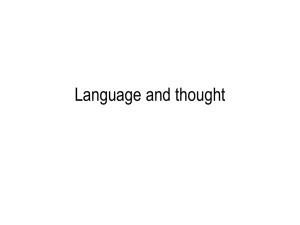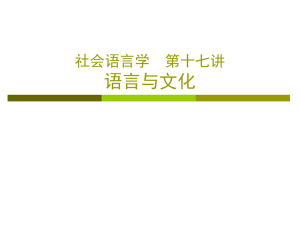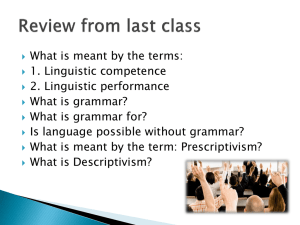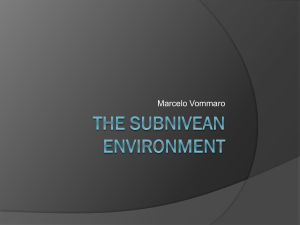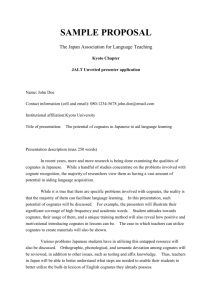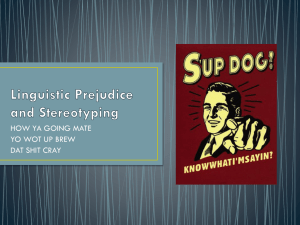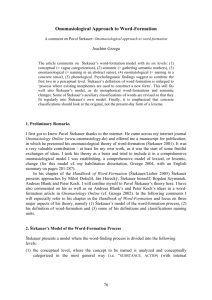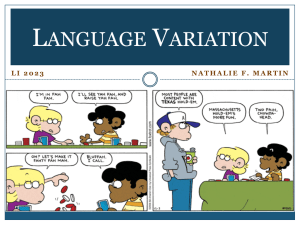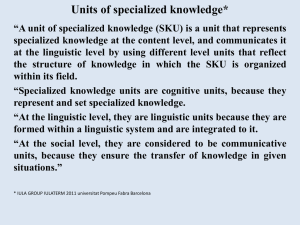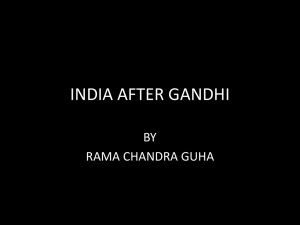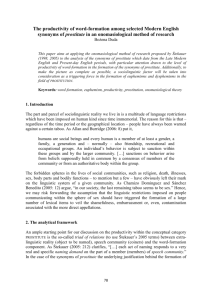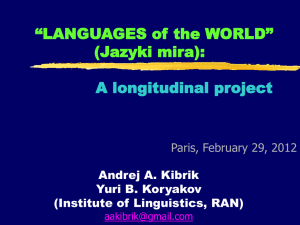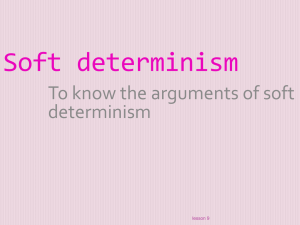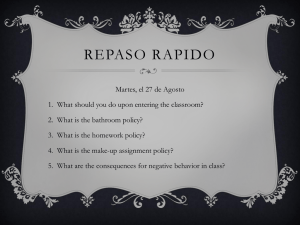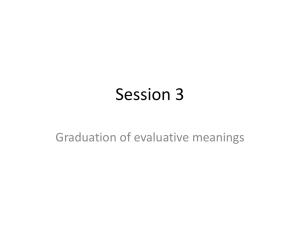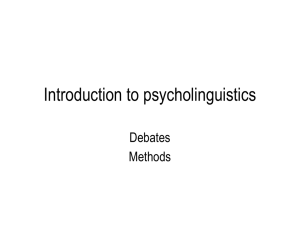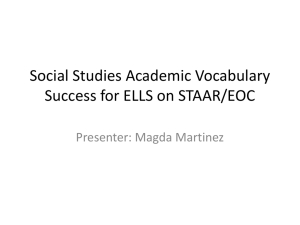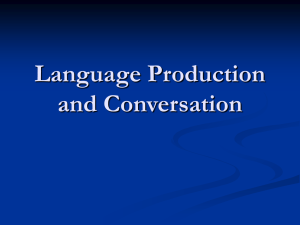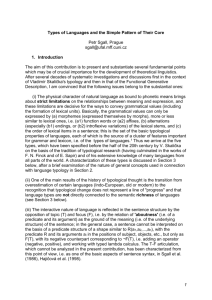TYPOLOGY OF THE LEXICAL SYSTEMS
advertisement
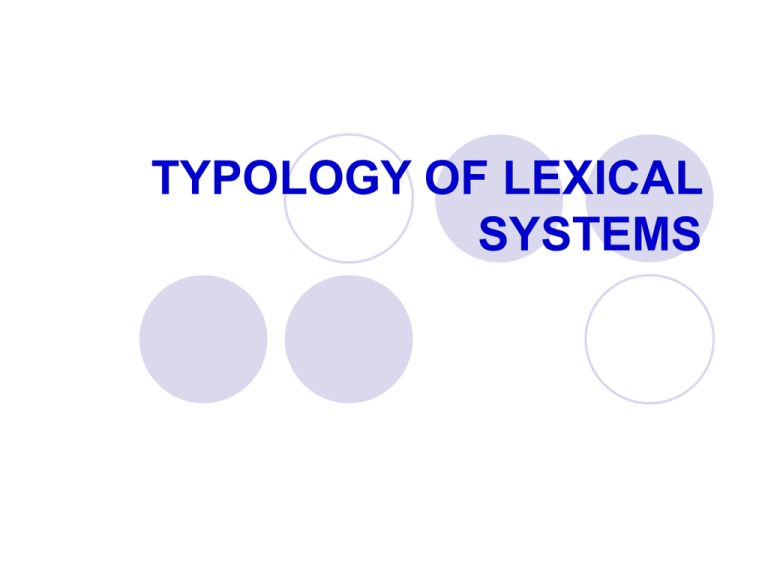
TYPOLOGY OF LEXICAL SYSTEMS OUTLINE 1. Language and culture - Linguistic determinism - Linguistic relativity 2. Typological classification of words 3. Semasiological and onomosiological approaches to the contrastive study of lexical units Cognitive triangle concept denotatum referent symbol Does Our Language Determine Our Culture? William von Humboldt Sapir and Whorf : Language controls a person’s thinking processes in some way. aput gana piqsirpoq qimuqsuq 'snow on the ground', 'falling snow', 'drifting snow', 'a snow drift'. How many colours can you see? English Italian Rumanian Estonian Japanese Ukrainian hand arm foot leg mano braccio piede gamba finger dito toe minǎ brat, käsi käsi(vars) te ude ruka picior jalg ashi noga deget sõrm varvas yubi palec’ Different nations seem not only to see but also to hear the world differently U. E. Jap. тук-тук rat-a-rat don-don U. E. Jap. French ква-ква croak- croak kero-kero coa-coa The concept that language limits perception has become known as the “Whorfian Hypothesis” or as “linguistic determinism”. The ideas of linguistic determinism in the XX c. In 1980 George Lakoff and Mark Johnson published Metaphors We Live By Our conceptual system plays a central role in defining our everyday realities: how we get around in the world and how we relate to other people. Language controls thought . Metaphors determine the way English speakers see the world Time I spent time on that project. I invested time on that project. I saved time on that project “Time is a valuable Commodity” The concept of argument in English Argument I shot down their arguments. I blew them out of the water with my points. I overcame each of their points. I won. I beat them (down) Argument is War Howard Rheingold’s 1988 book They have a Word for it The words of a language constrain how people perceive the world. ho’oponopono means “practice in which two people who have a disagreement are put in a room/hut until they agree” change the English speaking thought processes. Other views 1986 Eugene A. Nida: For the most part, language follows society rather than determining it. Hypothesis of “linguistic relativity” : “Language reflects the culture of its speakers rather than determining it. Language is an important index of cultural values, but does not necessarily constrain a speaker from seeing the world in another way.” 1997 A. Wierzbicka: Every language has certain key words that reflect the core values of a given culture. Key terms shy American versus Finnish being socially handicapped versus being reserved, observant, respectful of others’ privacy friend Are there any universal features in the lexical systems? Are there concepts that have word nominations in all languages of the world? Conceptual primitives Anna Wierzbicka: Conceptual primitives belong to the universal "alphabet of human thoughts" Universal semantic primitives Substantives: I, YOU, SOMEONE (PERSON), SOMETHING (THING), PEOPLE, BODY Determiners: THIS, THE SAME, OTHER Quantifiers: ONE, TWO, SOME, ALL, MANY(MUCH) Attributes: GOOD, BAD, BIG, SMALL Mental predicates: THINK, KNOW, WANT, FEEL, SEE, HEAR Existence and possession: THERE IS, HAVE Life and death: LIVE(ALIVE), DIE Time: WHEN(TIME), NOW, AFTER, BEFORE, A LONG TIME, A SHORT Space: WHERE(PLACE), HERE, UNDER, ABOVE, TOUCH (CONTACT) Etc. Typological classification of words Universal layer water, sky, ocean, day; brow, nose, live, eat, sleep; speak, mother, brother Specific-national (realia) layer терем, цимбали, гетьман, козак, писанка, вишиванка, рушник public school, Chapel, Boxing Day, Black Friday beefeater International layer genuine internationalisms loan internationalisms computer, blue tooth article - стаття Universal layer. Different connotations. Denotative (nominative) meaning white – the colour of milk, salt or snow (COD) black- the dark color of coal or night (Oxford) Connotative meaning white lie, white dove black soul, black market, blackmail Cf. in Chinese white man, white glance black man International layer. Cultural Differences in International Words False cognates ‘actual’ come from Latin ‘actualis’ 1. real actual costs 2. (rare) important ‘актуальний’ English-Ukrainian False cognates data? replica ? billet? accurate? intelligence? aspirant? сlay? fabric? complexion? conservatory? дата? репліка? білет? акуратний? інтелігентність? аспірант? клей? фабрика? комплекція? консерваторія? Semi-False cognates director 1. директор 2. режисер 3. диригент 4. духівник Mercury 1. Планета Меркурій 2. р директор 1. директор Меркурій 1.Планета Меркурій Words may be compared from their semasiological side and from their onomasiological side. Comparing words from the semasiological side Types of motivation Semantic structure of words Motivation of words Motivation is relationship between form and meaning of the word. friend friend-ship Words may be non-motivated and motivated E - 1/14 U - 1/6 phonetic morphological semantic hiss wisdom face (of the stone) 1,4% 0,8% 88% 91% 10% 7,4% Semantic structure of words in E and U coat піджак, пальто, хутро, оперення, шар, оболонка, обшивка, покривати шаром пливти ‘float’ ‘swim’ ‘sail’ Comparison of language units from the onomasiological side Types of nomination are the same in the contrasted languages: Simple words Derivative words Compound words Phrases Clauses Sentences Comparing language units from the onomasiological side in E and U Onomasiological structure may coincide: rewrite cal-breaker to make a decision - переписати вугледробарка прийняти рішення or may not coincide: ski fall in love merry-go-round - кататися на лижах - закохатися - карусель Differences in Word Collocations heavy traffic heavy-handed heavy-headed to make friends to make captain (to achieve the rank) інтенсивний рух неспритний тупоголовый подружитися стати капітаном (дослужитися до капітана) Analyse the onomasiological structure food processor - кухонний комбайн brown cap - підберезовик user-friendly легкий (зручний) в роботі energy-efficient - економічний misuse sibling mistrial - HOME ASSIGNMENT I.Korunets. Contrastive typology of the English and Ukrainian Languages. Typology of the lexical systems p. 118 -120, 141 – 146, 165 - 172 p. 175-177 Ex-s. 6, 7, 8, 9
